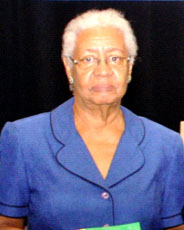Efforts to improve and standardise primary health care in Guyana were boosted by the Ministry of Public Health with the launch of the Second Edition of the Standard Treatment Guidelines (STGs) for Primary Health Care on Friday.
These guidelines, according to Minister of Public Health Dr George Norton, are essential to guaranteeing quality of care and allow for the monitoring of the effectiveness of treatment while also aiding in the development of the Essential Medicines List.

The finalised guidelines, which cover treatment for more than 160 common medical conditions and diseases, are the result of collaboration between the Ministry of Public Health and the United States Agency for International Development (USAID).
Project Consultant Dr Claudette Harry, in her presentation at the launch, explained that Guyana’s geography has over the years presented challenges to the ministry’s efforts to ensure access to quality health care for all citizens. The development of individual guidelines for the care and treatment for some priority diseases failed, she noted, because several illnesses prevalent in the country were not covered in these guidelines.
This oversight saw these diseases being managed according to physician preference until 2009, when the ministry decided to develop one document outlining STGs for the most commonly seen diseases/conditions affecting the population.
According to Harry, the decision was taken to focus on the primary health care level, taking into consideration the level of staff available.
Launched in 2010, the first edition of the STGs, Harry noted, focused on 60 diseases/conditions based on the existing morbidity data at that time. The second edition, which builds on the lessons learnt and the challenges encountered in the implementation of the previous edition, focuses on double the number of conditions.
It was compiled through consultations with physicians and specialists in both the public and private sector, and review of evidence-based literature over a period of two years (2013-2015).
Each speaker at the launch stressed the relationship between the STGs and the Essential Medicines List.
“Only medications available through that list have been used in the treatment of the diseases/conditions covered in the STG,” Harry said.
Referencing reports about the shortage of essential drugs and the wastage of others within Guyana’s health care system, Harry opined that the knowledge of the disease pattern in any community, district, region and the recommended treatment as contained in the STG should see a reduction in this phenomenon.
Norton expressed the hope that these guidelines, which are mandatory for the public health care delivery system, will also be implemented in the private health care sector so that there will be a unified approach to the management of diseases in Guyana.
Also present at the launch was Mission Director for USAID Christopher Cushing.
Cushing noted that “this project embodies two key tenets of the US Government’s support to partner countries: local capacity building and the creation of sustainable interventions.”
He explained that STGs “are the fundamental foundation upon which the whole health supply chain of a country is based, and compliance with these guidelines is imperative to the effective and efficient usage of pharmaceuticals and other medical supplies.”
Consequently, he said when it was noted during the Supply Chain Management System (SCMS) project collaboration with the Ministry of Public Health’s Materials Management Unit, that procurement and distribution of products could be standardised and streamlined, the first edition of STGs were developed.
“Several drugs of the same class were stocked, and procurement was often determined by prescribers’ preferences. Recognising the negative effects, particularly the waste of scarce resources, that such practices could have, SCMS, in collaboration with the [Ministry of Public Health] produced the first STGs for the primary health care level in Guyana in 2010,” Cushing said.
He further noted that the United States Government, through USAID, “is pleased to contribute to the Ministry’s efforts to ensure that quality service, with the rational use of drugs, result in the provision of quality care for all people in Guyana.”





